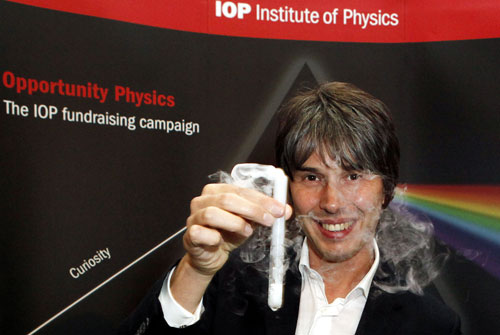
Manchester University physicist Brian Cox at the launch of the Institute of Physics’ fundraising campaign on 23 September 2013. (Courtesy: Richard Lewis)
By Matin Durrani
The Institute of Physics (IOP), which publishes Physics World, launched its first-ever fundraising campaign at a dinner at the Institute’s headquarters in London last night. The aim of the campaign, called Opportunity Physics, is to raise £10m over five years to let the Institute “significantly scale up” its work over the coming decades. The evening was hosted by Manchester University particle physicist Brian Cox, who is on the fundraising campaign’s board and is a familiar face as presenter of TV shows such as the BBC’s Wonders of the Solar System.
The Institute says it has identified a number of existing IOP projects that can be enhanced if further funding were available. Those projects are all centred on inspiring young people into physics, showing them what careers physics can lead to, helping physicists to flourish – whether they work in teaching, research or industry – and underlining how physics is central to a healthy, technology-led economy. With 52,000 members, the Institute already does a lot of good work, but it believes it can do even more with additional cash.
Other members of the campaign board include the Cambridge University organic light-emitting diode pioneer Richard Friend, incoming IOP President Frances Saunders, Cambridge soft-matter physicist Athene Donald and eminent Ghanaian theorist Francis Allotey. You can read more about the aims of the campaign on its website or in this article, which originally appeared in the September issue of Physics World, by outgoing IOP President Sir Peter Knight.
Through a series of video reports, guests at the event were shown some of the projects that the Institute already carries out, which include boosting physics in developing nations through teacher-training programmes in Africa as part of its IOP for Africa initiative and by running a programme of entrepreneurism workshops. Cox also quizzed senior IOP staff about the work they do, while there were pre-recorded video messages of support from Queen guitarist Brian May, who originally studied physics at Imperial College, as well as Konstantin Novoselov from Manchester, who shared the 2010 Nobel Prize for Physics with Andre Geim.
Guests – myself included – were treated to a “molecular dinner”, inspired by Peter Barham from the University of Bristol, who is a world leader in the field of “molecular gastronomy”. The meal included some unusual items, notably a tiny test tube filled with lime and green tea that had been frozen with liquid nitrogen, a venison carpaccio slow-cooked in a vacuum bag for 24 hours in a water bath, and roasted turbot whose fillets had been bound together using a “protein glue”.
If you would like to support the Institute in its fundraising initiative, please visit its campaign website.
Guidelines
Show/hide formatting guidelines
this text was deletedwhere people live in harmony with nature and animals</q>
Some text